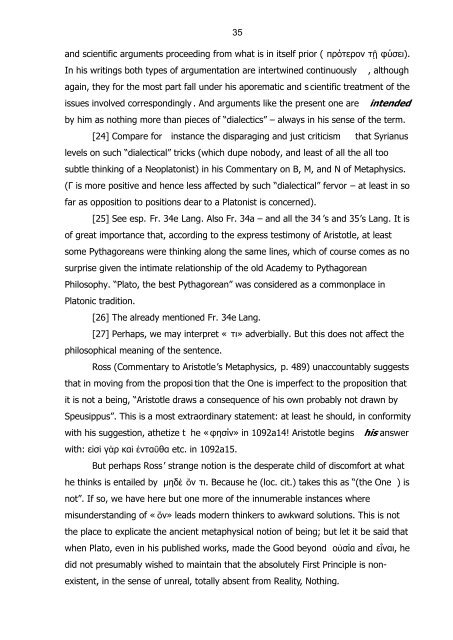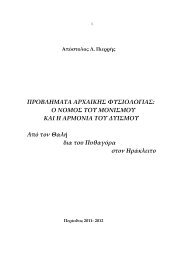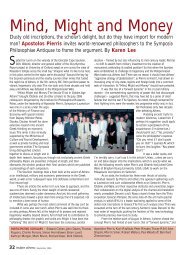Commentary on the Beginning of Damascius' De Primis Principiis
Commentary on the Beginning of Damascius' De Primis Principiis
Commentary on the Beginning of Damascius' De Primis Principiis
You also want an ePaper? Increase the reach of your titles
YUMPU automatically turns print PDFs into web optimized ePapers that Google loves.
35and scientific arguments proceeding from what is in itself prior ( πρότερον τῇ φύσει).In his writings both types <strong>of</strong> argumentati<strong>on</strong> are intertwined c<strong>on</strong>tinuously , althoughagain, <strong>the</strong>y for <strong>the</strong> most part fall under his aporematic and s cientific treatment <strong>of</strong> <strong>the</strong>issues involved corresp<strong>on</strong>dingly . And arguments like <strong>the</strong> present <strong>on</strong>e are intendedby him as nothing more than pieces <strong>of</strong> “dialectics” – always in his sense <strong>of</strong> <strong>the</strong> term.[24] Compare for instance <strong>the</strong> disparaging and just criticism that Syrianuslevels <strong>on</strong> such “dialectical” tricks (which dupe nobody, and least <strong>of</strong> all <strong>the</strong> all toosubtle thinking <strong>of</strong> a Neoplat<strong>on</strong>ist) in his <str<strong>on</strong>g>Commentary</str<strong>on</strong>g> <strong>on</strong> B, M, and N <strong>of</strong> Metaphysics.(Γ is more positive and hence less affected by such “dialectical” fervor – at least in s<strong>of</strong>ar as oppositi<strong>on</strong> to positi<strong>on</strong>s dear to a Plat<strong>on</strong>ist is c<strong>on</strong>cerned).[25] See esp. Fr. 34e Lang. Also Fr. 34a – and all <strong>the</strong> 34 ’s and 35’s Lang. It is<strong>of</strong> great importance that, according to <strong>the</strong> express testim<strong>on</strong>y <strong>of</strong> Aristotle, at leastsome Pythagoreans were thinking al<strong>on</strong>g <strong>the</strong> same lines, which <strong>of</strong> course comes as nosurprise given <strong>the</strong> intimate relati<strong>on</strong>ship <strong>of</strong> <strong>the</strong> old Academy to PythagoreanPhilosophy. “Plato, <strong>the</strong> best Pythagorean” was c<strong>on</strong>sidered as a comm<strong>on</strong>place inPlat<strong>on</strong>ic traditi<strong>on</strong>.[26] The already menti<strong>on</strong>ed Fr. 34e Lang.[27] Perhaps, we may interpret « τι» adverbially. But this does not affect <strong>the</strong>philosophical meaning <strong>of</strong> <strong>the</strong> sentence.Ross (<str<strong>on</strong>g>Commentary</str<strong>on</strong>g> to Aristotle’s Metaphysics, p. 489) unaccountably suggeststhat in moving from <strong>the</strong> proposi ti<strong>on</strong> that <strong>the</strong> One is imperfect to <strong>the</strong> propositi<strong>on</strong> thatit is not a being, “Aristotle draws a c<strong>on</strong>sequence <strong>of</strong> his own probably not drawn bySpeusippus”. This is a most extraordinary statement: at least he should, in c<strong>on</strong>formitywith his suggesti<strong>on</strong>, a<strong>the</strong>tize t he « φησίν» in 1092a14! Aristotle begins his answerwith: εἰσὶ γὰρ καὶ ἐνταῦθα etc. in 1092a15.But perhaps Ross’ strange noti<strong>on</strong> is <strong>the</strong> desperate child <strong>of</strong> discomfort at wha<strong>the</strong> thinks is entailed by μηδὲ ὄν τι. Because he (loc. cit.) takes this as “(<strong>the</strong> One ) isnot”. If so, we have here but <strong>on</strong>e more <strong>of</strong> <strong>the</strong> innumerable instances wheremisunderstanding <strong>of</strong> « ὄν» leads modern thinkers to awkward soluti<strong>on</strong>s. This is not<strong>the</strong> place to explicate <strong>the</strong> ancient metaphysical noti<strong>on</strong> <strong>of</strong> being; but let it be said thatwhen Plato, even in his published works, made <strong>the</strong> Good bey<strong>on</strong>d οὐσία and εἶναι, hedid not presumably wished to maintain that <strong>the</strong> absolutely First Principle is n<strong>on</strong>existent,in <strong>the</strong> sense <strong>of</strong> unreal, totally absent from Reality, Nothing.










